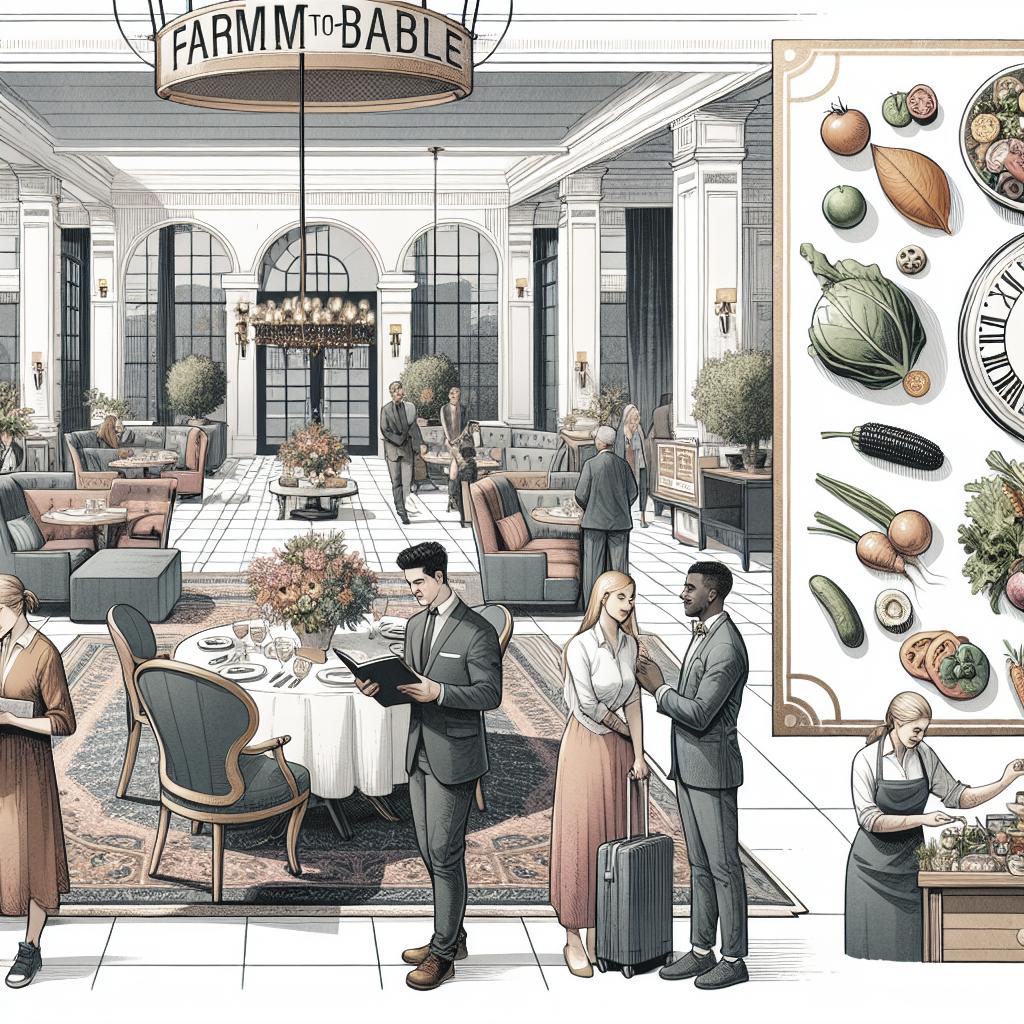How to Choose Hotels Offering Farm-to-Table Dining
With sustainability and ethical dining becoming significant interests among travelers, the farm-to-table food movement has blossomed. Selecting hotels with this dining option ensures you savor fresh, sustainably-sourced meals while supporting local agriculture. This post delves into essential considerations: food safety, processing, distribution, and community support that form the backbone of such dining experiences. From exploring the journey of dairy to understanding market access strategies for farmers, and the role local food systems play in strengthening communities, this guide provides a comprehensive look at making informed decisions when choosing your next farm-to-table dining experience.
Food Safety
One cannot overemphasize the importance of food safety in the farm-to-table dining experience. Hotels must ensure that their partner farms adhere to stringent hygiene and safety standards. This involves the oversight of agricultural practices, pest control, and sanitation protocols that safeguard the quality of food right from the farms to the dining table.
Additionally, understanding the certifications that partner farms hold can provide insights into their commitment to food safety. Look for designations like USDA Organic or GAP (Good Agricultural Practices) certification as evidence of stringent quality checks and safety measures.
Food Processing
Farm to Table Video: Exploring Grass-Based Dairy
Processing plays a crucial role in preserving the nutritional value of food served at farm-to-table dining establishments. Grass-based dairy, for example, offers a fascinating glimpse into the farm-to-table chain, showcasing differences in processing from conventional dairy methods.
Understanding these processes helps guests appreciate how flavor and nutrition are affected by the methods used. A hotel’s transparency in sharing this information can be a testament to their commitment to sustainable practices.
Distribution and Aggregation
Effective distribution and aggregation practices ensure that food retains its freshness by the time it reaches hotel kitchens. Look for hotels that partner with efficient logistics providers who understand the specific needs of fresh produce transportation.
This focus on efficiency minimizes waste and ensures timely delivery. Aggregation offers smaller farms opportunities to participate in larger markets, expanding the availability of diverse products.
Why Local and Regional Food Systems?
Local and regional food systems form a robust part of the farm-to-table philosophy. They help hotels maintain a direct line of supply, avoiding the pitfalls of longer supply chains that often compromise quality.
These systems foster relationships between hotels and farmers, promoting trust and allowing for greater food traceability. This ensures that guests enjoy the freshest seasonal produce whenever they dine.
Improving Business Capacity
For farm-to-table dining to thrive, improving business capacity both for hotels and farmers is essential. Continuous training and development in sustainable practices ensure that both parties reap the full benefits of this relationship.
Hotels that invest in such programs typically deliver consistent quality, as their partner farms are well-equipped and knowledgeable about innovative agricultural techniques and market demands.
Accessing Markets and Marketing
Accessing markets is a critical component for farms associated with farm-to-table hotels. These hotels often act as an expanded marketplace, bringing exposure to lesser-known products and supporting regional economic growth.
Innovative marketing strategies that highlight the unique attributes of farm-to-table offerings can attract a diverse clientele who value authentic and ethical food experiences.
Farm to Table Video: Direct Marketing for Farmers and Ranchers
Direct marketing efforts play an instrumental role in connecting farmers directly to consumers in the farm-to-table context. Videos and interactive content can effectively showcase the journey of food from the farm to the dining table, offering guests transparency and confidence in their food choices.
This direct connection fosters loyalty and appreciation for the integrity and hard work behind each meal served.
What are the components of a farm to school program?
Farm to school programs are an excellent model of how farm-to-table practices can extend beyond hotels and into the community. These programs involve local farms supplying fresh produce to school cafeterias, enhancing the nutrition and education of students.
The involvement of various stakeholders—farmers, educators, students, and parents—helps strengthen communal ties while promoting healthy eating habits and awareness from a young age.
Strong Communities
The farm-to-table approach contributes significantly to building strong communities. By supporting local farmers, hotels encourage economic resilience and local employment, enhancing community development.
Topics
Understanding the primary topics revolving around farm-to-table efforts, such as sustainability, ethical sourcing, and community engagement, can enhance travelers’ dining experiences. Each topic encapsulates a critical aspect of responsible and enjoyable dining.
Being informed about these topics fosters a deep appreciation and considered choice in selecting hotels that truly commit to making a difference.
Locations
Choosing a location that is deeply entrenched in agricultural activities can significantly enhance the farm-to-table dining experience. Hotels situated in fertile, farming-friendly locales usually offer a more authentic and seasonally dynamic menu.
These locations provide easier access to fresh produce, supporting the ethos of the farm-to-table movement and ensuring that guests can enjoy meals that are both delicious and sustainable.
Formats
Farm-to-table dining can manifest in different formats, from lavish buffet spreads to intimate tasting menus. Each format offers unique insights into the creativity and dedication of chefs who work closely with local producers.
Understanding these formats helps diners appreciate the preparation and effort that go into crafting a conscientious menu—a crucial factor when choosing a hotel for your stay.
Final Thoughts
| Aspect | Key Points |
|---|---|
| Food Safety | Importance of hygiene standards; certifications indicating safety. |
| Food Processing | Grass-based dairy processing; transparency in food processing practices. |
| Distribution and Aggregation | Efficiency in logistics; support for small farms through aggregation. |
| Local and Regional Systems | Benefits of direct supply chains and enhanced food traceability. |
| Improving Business Capacity | Training and development in sustainable practices for consistent quality. |
| Accessing Markets and Marketing | Expanding market exposure for regional economic growth; innovative strategies. |
| Strong Communities | Economic resilience and local employment through support of local farmers. |
| Topics, Locations, Formats | Understanding sustainability and authenticity; choosing agriculturally rich locations; exploring various dining experiences. |


